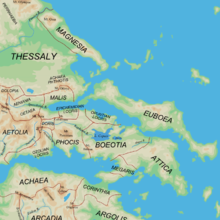Phlegyer
The Phlegyer ( Greek Φλεγύαι / Phlegyai ) were a people in ancient Greece .
They had their main residence in Thessaly . But they also settled in central Greece, where, in addition to Boiotia, the Phocian city of Panopeus was their center and the Phlegyians emerged as the main bearers of the Asclepius cult. They are also said to have settled in Arcadia .
As with most of the peoples of that time, history and legends are difficult to tell apart. In Greek mythology , the Phlegyers were considered a predatory and violent people, whose capital was the Thessalian Gyrton . They fought in the Trojan War and conquered the city of Thebes under their king Eurymachus . The rowdy Phorbas beheaded travelers on the sacred road to Delphi .
Phlegyas is named as the ancestor of the tribe . The legend refers to the Boiotic settlement of the Phlegyes and describes a kingdom in the district of Orchomenos as the origin, a city of the Minyans . The area was previously called Andreïs, after Andreus , Eteocles' father . After Eteocles' death Phlegyas took over the rule and the land was renamed Phlegyantis (Φλεγυαντίς). The new king founded the city of Phlegya, where he gathered "the most arguable of the Greeks" around him. Finally, the Phlegyians are said to have been destroyed there by the Aiolians .
In relation to Apollo and his son Asclepius, mythology provides diametrical contradictions. On the one hand, Phlegyas is said to have set fire to the Asclepius sanctuary and the Phlegyers tore down the Delphic temple, etc., on the other hand, the tribe worshiped the god of healing and was considered the favorite of their father Apollo. The explanation for this is that the respective stories refer to different Phlegyer tribes (Thessaly, Boiotien, Phokis).
literature
- Gustav Türk : Phlegyas . In: Wilhelm Heinrich Roscher (Hrsg.): Detailed lexicon of Greek and Roman mythology . Volume 3.2, Leipzig 1909, Col. 2378-2383 ( digitized version ).
Individual evidence
- ↑ Klaus Tausend: Amphiktyonie and Symmachie . Franz Steiner Verlag, 1992, p. 45 ( books.google.at )
- ↑ August Schultz : Phlegyersagen , in the year book for classical philology 1882 , p. 345ff
- ↑ Pherekydes in Scholion to Homer , Odyssey 11, 262 and 11, 264; Scholia to Homer, Iliad 13, 302; Eustathios of Thessalonica , Commentary on Homer's Iliad , p. 933, 14.
- ↑ Ovid , Metamorphosen 11, 414; Scholion to Homer, Iliad 23,660; Philostratos , Eikónes 2, 19, 1, 4.
- ^ Johann Christoph Gatterer : Outline of the universal history . Section Special History of the Greeks , p. 236 ( books.google.at )
- ↑ Hermann Gottlob Plass: History of ancient Greece . P. 237 f. ( books.google.at )
